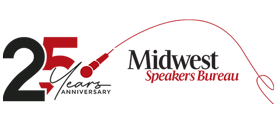Tips from “Finding, Hiring and Working with Professional Speakers,” a presentation for meeting professionals by Todd Hunt
1) Be clear on what your audience likes and/or doesn’t like, and tell your speaker in advance.
I’ve done programs for groups that love interactive activities (administrative people, for example). I always ask, “Does your group expect audience participation?” A CPA client once replied, “Absolutely not! They’re CPAs – they just want to sit and listen.” So for that engagement, I just stood and talked.
2) Try to give your speaker the room setup we want. If I request Chevron style, it’s because I know from hundreds of presentations that Chevron is most effective for my program, and will give your attendees the most value. Of course, if your next event in that space is a meal and there’s no time to change it over, tell your speaker. A professional will work with you.
3) Please don’t change the description of your speaker’s program (or the speech title) without checking with her.
My keynote is called “Communication Bleeps and Blunders in Business.” I have shown up and discovered in the printed program that I’m speaking on “Business Communication Blunders” or “Bloopers and Bleepers.” At one event, it was “Dealing with Jerks in the Workplace!”
We spend a lot of time crafting our titles, so if it doesn’t fit your theme, or you want a different slant, talk to us and we’ll come up with something that works. Just don’t change it on your own – that’s like a hotel putting you in a different session room or changing the menu without telling you first.
4) Review the speaker’s entire speech; not just excerpts. Anyone can be good for 10 edited minutes. The real question is can they hold your audience for a full hour? A client once told me, “I watch a speaker’s video for his style, and I listen to a CD for his content.”
5) You don’t pay more going through a speakers bureau; and you save a lot of time!
A bureau is like20a travel agency – you don’t pay more, because the bureau gets a percentage off the top. Speakers turn over a portion of their fee so they don’t have to secure the booking, do the paperwork or handle the money.
Finding good speakers is what a bureau does day in and day out, which means you don’t have to slog through hundreds of DVDs or spend hours online. Just tell the bureau, for example, “We’re looking for a dynamic speaker to kick off our annual meeting at 9 in the morning for an hour. We want humor, a=2 0little general information, and lots of energy to charge people up for the conference that follows.”
The bureau then gives you four or five candidates to talk with on the phone, watch their DVDs and/or listen to their CDs. And because the bureau books hundreds of speakers, they know who’s good – they will not tarnish their reputation by recommending someone who won’t deliver.


I found your blog on google and read a few of your other posts. I just added you to my Google News Reader. Keep up the good work. Look forward to reading more from you in the future.
I agree with all in this blog! Thank you
Most useful post of this month!
Thanx a lot! It’sa mega post!
Thank you for this blog! =)
Howe may I found this information in italian?
Very interesting post, respect to blogegr!
Nice post about Midwest Speakers Bureau Blog » Tips from “Finding, Hiring and Working with Professional Speakers,” a presentation for meeting professionals by Todd Hunt. I am very impressed with the time and effort you have put into writing this story. I will give you a link on my social media blog. All the best!
I’ve found that meeting planners want to be involved in the whole process of your speech. If they “bless” the entire speech beforehand and have put their mark on it, you have a much better chance of making them happy. Then all you have to do is deliver that speech 100%.